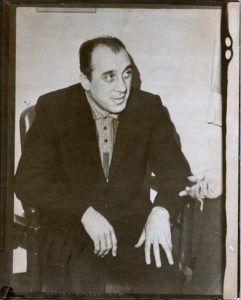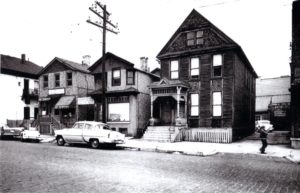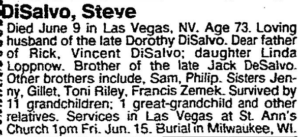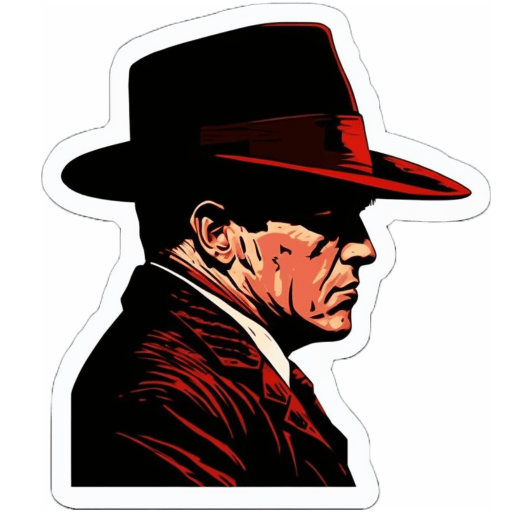Steve DiSalvo
Steve DiSalvo was born in West Allis, Wisconsin on June 9, 1918 to Vincenzo “James” DiSalvo and Angeline Foti. How he became affiliated with organized crime in Milwaukee is something of a mystery. Most mobsters had a connected father, uncle, or father-in-law. DiSalvo, as far as I’ve been able to determine, had no such connection. His father had come from the village of Milazzo, and his wife, Dorothy, wasn’t even Italian.

FBI file notes on Steve DiSalvo, can be found here.
DiSalvo’s first major brush with the law came during World War II when he burglarized the local Office of Price Administration (OPA). Many things, from sugar to gasoline, were rationed during the war, and the ration stamps were quite valuable on the black market. Beyond that, DiSalvo seemed to evade the headlines. Who his friends were or who sponsored him for Mafia membership is unknown and may never be known.
What we DO know is that by 1959, when the FBI took an active interest in Milwaukee’s criminal underworld, Steve DiSalvo had become very close to Frank Balistrieri, who was on the verge of becoming the next boss. His closest associates were Frank Stelloh, Buster Balestrere and Joseph Gurera, all considered to be “enforcers” for the mob. Balestrere and Gurera had been “imported” from Kansas City, where they had been known hitmen. DiSalvo’s official job was purchasing agent for Gallagher’s, a Balistrieri establishment.
By 1962, the “enforcers” had set up a front for the mob’s growing gambling business. They operated out of various laundry dropoffs: United Cleaners on South First Street and Star Brite Cleaners on North Holton. The businesses were real. Bookies dropped off bets alongside customers dropping off dirty linen. Their gambling operation was alleged to be part of a much larger network in the Midwest. Indeed, they were occasionally seen in Milwaukee meeting with top Chicago mobsters such as Felix Alderisio (a future mob boss) and Rocco Fischetti (often identified incorrectly as a cousin of Al Capone).
DiSalvo and Gurera would meet up with others at various taverns and restaurants, but also the Para Corporation – a business that sold questionable slot machines. Frank Balistrieri would purchase old machines and have handyman Walter Brocca put them in new cabinets to hide their age.
Tony Biernat
In January 1963, Kenosha jukebox distributor Tony Biernat was kidnapped and murdered. DiSalvo was considered a suspect. Shortly before the murder, DiSalvo had visited Biernat and attempted to buy out his business; he declined. Personally, I do not believe DiSalvo had taken part in the actual kidnapping and murder, though he may have known who was involved. (This case is covered in detail in my book Shallow Grave) The heat was bad enough that Joe Gurera and Buster Balestrere left Milwaukee.
One month after the Biernat murder, DiSalvo was mentioned as a suspect in the death of Fond du Lac cheese businessman Leroy Summers. Though the official cause of death was suicide, Summers’ widow believed DiSalvo may have been responsible and alleged that the two had been meeting. Summers was also investigated for a scheme where he hid heroin in packages of cheese, but nothing ever came of the drug or alleged homicide angles.
[For more on Tony Biernat’s murder, check out Shallow Grave: The Unsolved Crime that Shook the Midwest]
Peter Sciortino
At the end of 1963, DiSalvo’s name came up once more – this time as a suspect in a bombing campaign against baker Peter Sciortino. Someone had bombed both the bakery and Sciortino’s home, though no one was injured. Authorities suspected the bombs were in response to Sciortino refusing to pay “protection” money.

Gambling Activities
In the second half of the 1960s, Steve DiSalvo divided his time between businesses that were apparently legitimate, as well as the ongoing overseer of gambling. On the gambling end, he oversaw an apartment that became known as “The Office.” A rotation of bookies headed by Antonio “The Sheriff” Cefalu answered a number of telephones running to the apartment, each one a steady stream of sports bets coming in. Keep in mind, at this point in time, a telephone line was connected to a specific device rather than to a room or building. In 1968, “The Sheriff” retired and the new head bookie was Frank Hogan, who was also known as “Bigfoot” or “Frank Hogan.” The bookies, in turn, paid 20% of their earnings to DiSalvo. The retirement was timely; Cefalu died a year later.
In the early 1960s, Bobby Pick heard that gamblers in Milwaukee were being harassed by the Mafia. One night at Gallagher’s, he was motioned into the bathroom by Steve DiSalvo. DiSalvo asked him if he had been pressured, and Pick said no and he would not pay if he was asked to. As Pick left the bathroom, a man with a pistol in his belt blocked the door, but DiSalvo waved him off. Around this time, gamblers were having trouble paying Pick — one man who owed $6000 paid Pick instead with tropical fish. One of Pick’s bartenders was told by Vince and August Maniaci that Pick was to pay $100 a week, but Pick was never told to pay directly and never did. In the mid-1960s, Pick was sent to Sandstone Prison for gambling. He had been getting his line from Frank Sansone.
Businesses
In business, DiSalvo joined the Mat Corporation of America as vice president, treasurer and secretary. The business placed mats at the entrances of industrial and commercial buildings. The office was shared with Herman “The German” Sosnay’s Greenfield Development. DiSalvo also helped out Sosnay, who he had known for 25 years, and was pulling in around $7500 annually in commissions on appraisals for Greenfield Development. Sosnay had also known Frank Balistrieri since childhood, and had invested with him on the remodeling of a $27,000 building on North Water Street.
DiSalvo and Sosnay also branched out, building a 114-unit apartment complex in Mundelein, Illinois. Dominic Principe, another suspect in the Tony Biernat murder, was named the complex manager. At this point, in late 1968, law enforcement stepped up its pressure on DiSalvo. Sosnay was interrogated repeatedly, which he claimed only elevated his blood pressure. Authorities later found out that DiSalvo had financed the purchase of the complex with a fraudulent FHA loan, but by the time they found out he was already making payments on time and chose not to pursue it.
When DiSalvo found out the Milwaukee Police Department had put a 24-hour surveillance on him in September 1968, he decided to waste their time. DiSalvo drove to Gary, Indiana and then to western Illinois for no apparent reason. The police suspected DiSalvo would soon be promoted while Frank Balistrieri served a short prison sentence for taxes. Rather than catch him doing anything illegal, however, they merely followed him to Illinois daily for no reason and soon realized he was trying to get them to mess up so he could sue for harassment.
Entering the 1970s, “The Office” management switched yet again, this time to Sam Librizzi. Interestingly, Librizzi was a second generation bookie. His father was even known as “The Book,” and was one of the first people ever to face federal gambling charges.
After a series of appeals and delays, Frank Balistrieri reported to Sandstone federal prison in Minnesota on June 28, 1971, being chauffeured there by Steve DiSalvo in a rented car rather than escorted by US Marshals in order to avoid handcuffs and publicity. While away, he placed Joseph Caminiti as the acting boss and his brother Peter as the underboss. DiSalvo was not promoted, but maintained his position as one of the three captains. Balistrieri was eligible for parole in four months, and if he maintained good behavior, would serve his full term after only 294 days.
Throughout 1974, DiSalvo and Frank Stelloh would meet for breakfast almost daily at the Pancake House (Highway 100 just south of Grange Avenue). That summer, Anthony Pipito was released from prison and during the day would alternately serve as DiSalvo’s bodyguard and a dishwasher for Sally’s Steak House. At night, he was in a halfway house. Pipito had been mixed up in a number of things, primarily prostitution (which made headlines when he supplied comedian Sid Caesar with a date), and he would later be one of the key cocaine distributors in Milwaukee. The guys stopped meeting at the Pancake House once a waitress told them the FBI had been in asking questions.
State agent Gary Hamblin subpoenaed Steve DiSalvo on March 4, 1975 to appear at a John Doe hearing on the 8th. DiSalvo fought Hamblin, saying, “I’m not taking anything. Don’t give me anything. I’ll knock you on your ass. I’ll twist that mustache around your neck.” DiSalvo did, in fact, skip the hearing and was charged with contempt. He was released after paying $1,000.
Around September 1975, Steve DiSalvo had been appointed to the Board of Directors at Del Chemical in Menomonee Falls. The company, under the leadership of Rocco Youse, had faced a great deal of legal scrutiny for its use of kickbacks and bribes in order to sell more product. They primarily sold to municipal accounts, and purchasers would get cash bonuses for ordering more than a city needed. The business, before its downfall, was very successful, with a branch in Reno.
The new breakfast hangout in 1976 was Meurer’s Restaurant and Bakery (Forest Home at Morgan), again an almost daily occurrence for DiSalvo and Stelloh. At this point, they no longer cared who followed them. The FBI noted they were regularly followed to there by two other men; a license plate check determined the cars were unmarked police cars. The tail was not subtle in the least. This close surveillance lead to them witness Steve DiSalvo removing a gun from a trash can outside of a Menomonee Falls McDonalds’s in February 1976. The gun was confiscated and traced, but was “clean.” DiSalvo sued the police alleging that they had used “unconstitutional strong-arm tactics, threats and obscene language” against them. The judge was not sympathetic.
In October 1976, the FBI discovered where Sam Librizzi would meet up with DiSalvo – in the St. Michael’s hospital parking lot. On multiple occasions, they took photographs of Librizzi removing cash from his trunk and handing it to DiSalvo. Soon after, DiSalvo would drive to Frank Balistrieri’s house.
In early 1977, DiSalvo‘s hangout was the Country Kitchen in Hales Corners.
Undercover Special Agent Joseph Pistone
On August 25, 1978, Special Agent Joseph Pistone of the FBI, acting undercover, and Benjamin Ruggiero went to Snug’s Restaurant in Milwaukee, where they observed Frank Balistrieri seated at a table with Steve DiSalvo and others. Balistrieri motioned Ruggiero over to his table, and Pistone remained in the bar area. After about twenty minutes, Pistone was escorted to Balistrieri’s table and Pistone was introduced to Balistrieri and DiSalvo. After this meeting, Ruggiero told Pistone what Balistrieri had said to him before he was escorted to his table, which was essentially that Balistrieri and DiSalvo oversaw a gambling operation called “the office” and the profitable football season was about to begin.
Late on the evening of August 26, 1978, at the Peppercorn Restaurant in Milwaukee, Balistrieri and DiSalvo revealed their roles as owner and manager respectively of the gambling business operated by Sam Librizzi in 1977. This conversation began with a discussion between Pistone and DiSalvo concerning the upcoming football season and bookmaking in general. As the conversation proceeded, DiSalvo advised Pistone in the presence of Balistrieri and Ruggiero, that he was the one who handled Balistrieri’s sports bookmaking operation, that he wanted to get out of it, and that he was trying to talk Balistrieri out of the bookmaking business. The reason given by DiSalvo was that most of the bookmakers in Milwaukee were “stool pigeons” and he was attempting to convince Balistrieri to charge the other bookmakers in Milwaukee $1,000 a week in order to operate. In this way, DiSalvo explained, the bookmakers would be prevented by their own illegal activities from going to the FBI. DiSalvo further stated that there were so many stool pigeons in Milwaukee that they would need “Castro’s army to kill all the stool pigeons that Milwaukee had.” At this point in the conversation, Balistrieri confirmed that DiSalvo was in charge of his bookmaking operation and that he “Was looking for an individual to oversee the day-to-day operation, because the person that was running it last year, by the name of Sam, did not tend to business and wasn’t doing a good job and he was looking for someone he could trust to run the daily, the day-to-day operation for the upcoming football season.” Balistrieri further advised that they wanted somebody to take over this gambling operation from Sam, “so Steve wouldn’t have to spend so much time taking care of the book.”
[Joe Pistone wrote a book about his undercover experience]
After Balistrieri announced that they were looking for someone to replace Librizzi, Ruggiero volunteered Pistone’s services to take over the day-to-day handling of Balistrieri’s bookmaking operation. Pistone concurred in Ruggiero’s offer. At that point, Balistrieri took Ruggiero aside and spoke with him out of the presence of Agent Pistone. Balistrieri said he would have to call New York and that he (Balistrieri) was holding Ruggiero responsible.
After Balistrieri and Ruggiero concluded their private discussion at the Peppercorn, they returned to the area where Pistone was standing and Balistrieri, in DiSalvo’s presence, advised Pistone to contact DiSalvo and make arrangements to meet with him to go over their bookmaking operation. At this point, DiSalvo agreed that Pistone should contact him to set up a meeting.
On September 13, 1978, Frank Balistrieri, Steve DiSalvo, Peter Balistrieri, and Joseph Balistrieri met at Snug’s. Peter and Frank Balistrieri had just returned from a federal grand jury appearance. Peter Balistrieri told DiSalvo, “You got a problem.” Frank Balistrieri then told DiSalvo that the government had pictures of him meeting Sam Librizzi, “At the hospital … where you picked up the money.”
On October 1, 1981, a federal grand jury handed out numerous indictments, most of which did not directly involve Steve DiSalvo. Charged with multiple violations of gambling laws: Steve DiSalvo, Peter Picciurro, Sam Librizzi, Dennis Librizzi, Carl Micelli, John Piscuine, and Eugene Kawczynski. Charged with single counts of violating gambling laws: Joseph Volpe, Richard Panella, George Kopulos.
Prison
After years of delays and trials, on May 30, 1984, Steve DiSalvo, 65, was sentenced to eight years in prison. Sam Librizzi was sentenced to one year and one day in prison and fined $15,000. Carl “Matches” Micelli was put on three years probation and fined $5,000. The appeals court upheld the conviction.
An informant in the Sherman, Texas prison told the FBI that Steve DiSalvo told him about a time that he and Frank Stelloh were wiring a car to explode. DiSalvo also complained about the failure on Balistrieri’s part to help him get out of prison. DiSalvo said “we made the Balistrieris” and “we did a lot of work for them, but they aren’t helping.” DiSalvo was scheduled for release in May 1990 and allegedly had planned to go into the heroin and cocaine trade.
Death
Whatever his plans, DiSalvo died of brain cancer at age 73 on June 9, 1990 at a Las Vegas hospice. He had just been released from the Federal Medical Facility in Springfield, Missouri less than a month earlier.


